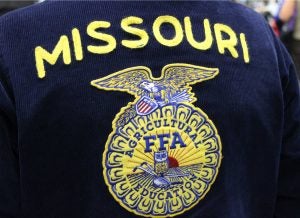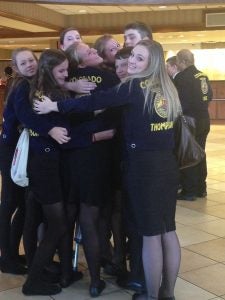Ask any current or former FFA member what the very best part of being a member of that inclusive club was. I can almost guarantee you their answer will be one of the things: the things they learned, the places they went, and the people they met.
In my case, it was the people.
CDEs, camp, meetings, team-building, class, banquets, conventions, and square dances all introduced me to vastly different kinds of people from all over the country, and some from outside our 50 states. I was lucky enough to be highly involved on a local level and spend countless (sometimes never-ending) hours with my fellow chapter members.
They taught me how to work in teams and how to support from the bottom up, and how to cheer on students I barely knew and celebrate victories that seemed small to me but were everything to someone else. My chapter checked my ego when it was needed, and picked me up when I was down.

But there are a few things I never imagined I would learn from the five years I wore the blue corduroy jacket — one of which being the complete impracticality of corduroy in any weather. What I really retained didn’t come from Mr. Bluck’s classroom, Mr. Hanselman’s shop, or Mr. Griffith’s creed speaking practices. It came from everything in between.
The Teays Valley FFA Chapter in Ashville, Ohio, taught me how to be a better friend in what seemed to be the most unexpected ways — but looking back, were completely predictable.
First of all, part of being a friend is being trustworthy. Some of the events and activities in FFA are team-based, like sales, parli pro, and small engines. Being a vital part of the success or failure of a small team is an incredible opportunity many don’t get to experience. The weight of that responsibility forges friendships out of equal parts stress, laughter, and long bus rides.
Being the one with the extra hair tie, gum, snack, safety pin, or clear nail polish will almost always make you the one people go to in a crisis, big or small. They know you have their back, especially when the zipper on their skirt is stuck. When you prove yourself in the little moments, people count on you when it matters most.

Second, you make friends in seemingly random places. For example: Brent. I was a senior; he was a sophomore. We met in the hall outside of a job-interview contest. He was nervous, and his jacket was way too big on him. As a seasoned veteran of that CDE, I took it upon myself to gauge his mood. We talked for a while, he seemed to calm down a little, and we both went on our way.
I saw Brent again years later, at a college party. He remembered our first meeting — a moment that I had completely forgotten until he mentioned it. You never know who you’ll meet and where you will see them again, so be good to those around you.
The third — and probably the most vital way FFA made me a better person, and by extension a better friend — was how to humble myself. This was a hard one. As an independent, confrontational teenager who hadn’t learned how to control her temper or tongue yet, I was prone to saying hurtful things I didn’t mean to people who didn’t deserve it. Specifically, as a sophomore I didn’t get something I felt I deserved. It went to someone else, instead. Needless to say, I didn’t take it well and wound up hurting a lot of people publicly.
Not only did I instantly regret my words and the venom behind them, I knew every shred of respect I had fought so hard to earn was scarred. Learning the lesson of rebuilding the decimated credibility was hard-fought. I apologized to each individual person and supported them in their roles any way they would allow me. I stayed after school and helped with contests, shop cleaning, paint organizing — anything to show that I could be trusted again.
Thankfully, by the time the opportunity came around again a year later, it all worked out. But, I did have to face my words one final time, in front of the person I had hurt so badly.
When all is said and done, the FFA puts students into real-life situations under a veil of education. You learn and grow based on where you find yourself and what fires you’re tossed into. It’s up to you whether you will learn from it and become better than you were the day before, or if you will let the lessons pass by.
Jessy Woodworth is a graduate of The Ohio State University, where she studied agricultural communication and animal sciences.



